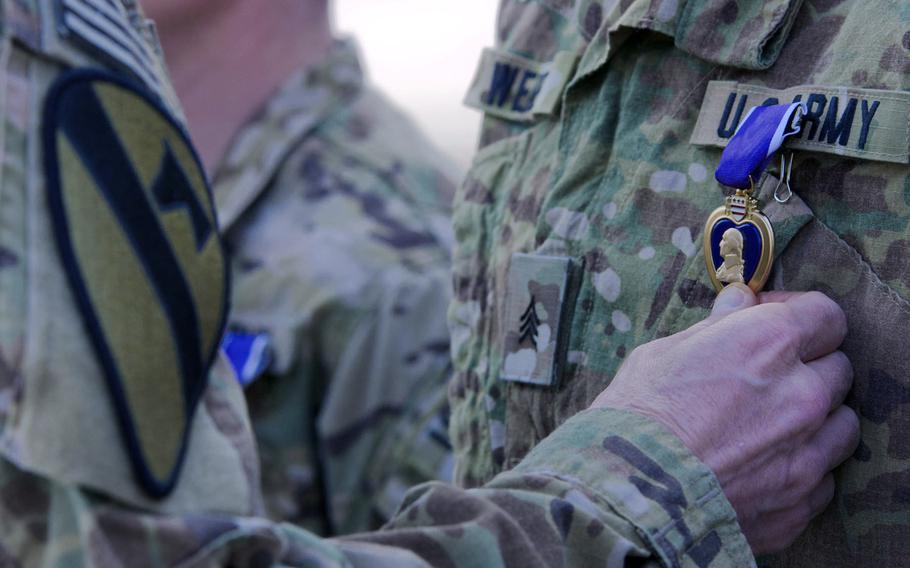U.S.
Pentagon: Drone pilots, cyber warriors might get medals after all
Stars and Stripes March 20, 2014

A soldier receives a Purple Heart medal at Forward Operating Base Salerno, Nov. 5, 2011. (Ken Scar/U.S. Army)
WASHINGTON — The Defense Department will reconsider the sensitive issue of whether drone operators and cyber warriors will receive a medal for their service far away from combat areas, Pentagon Press Secretary Rear Adm. John Kirby told reporters Thursday.
Lawmakers, meanwhile, have ordered two separate reviews that look at how the military awards Purple Hearts, largely due to disagreements over whether victims killed and injured in the shootings at Fort Hood and at a recruiting center in Little Rock, Ark., should be entitled to the medal.
Former Defense Secretary Leon Panetta’s announcement last year that a new Distinguished Warfare Medal had been created for outstanding drone pilots and cyber operators drew heavy fire from veterans, politicians and others who objected to it being ranked above the Purple Heart and other decorations earned in direct combat. Secretary of Defense Chuck Hagel canceled the medal soon after he took office, and said DOD would instead create a new device to affix to existing medals. But that decision is being revisited as part of an upcoming study of the military’s decorations and awards system that Hagel ordered Thursday.
The “comprehensive” yearlong review, to begin June 1, will be led by acting undersecretary of defense for personnel and readiness Jessica Wright, who will work closely with Joint Chiefs chairman Gen. Martin Dempsey, the services, and the combatant commanders, according to Kirby.
“[The study] will determine the best way to recognize servicemembers who use remote technology to directly impact combat operations, such as through cyber and remotely piloted aircraft … That’s part of the review, whether or not we should have a special device to go on another ribbon or [a new] medal,” Kirby said.
The review team will also look at the processes and procedures for how medals for valor are nominated in order to determine whether they can be improved, according to Kirby.
Based on his own military experience, Hagel is concerned that many acts of valor are going unrecognized for bureaucratic reasons.
“[Hagel] talked about seeing his own comrades there in Vietnam doing incredibly brave things, and that many of those things will go completely unheeded because they were never written up because of the pace and speed of war and … the constant pressure to keep going,” Kirby said. “Many heroic acts never got — never got noticed, never got written up, never got submitted.”
Hagel received two Purple Hearts and the Combat Infantryman Badge during his service as an Army infantry squad leader in Vietnam.
“[Hagel] believes it is imperative that DOD conduct this review as we conclude combat operations in Afghanistan,” Kirby said.
Another aim of the study is to consider whether to create more uniformity among the services when it comes to recognizing valor.
“There are some awards and medals you get that are service-unique [such as the Navy Cross]. It’s a fair question to ask: Do we need to look at the kinds of awards that we give, particularly for combat valor, in a more joint nature than perhaps some of them are? It doesn’t mean that there will be changes, but I think [Hagel] wants to look at everything across the whole scope,” Kirby said.
The services don’t always use the same criteria when judging whether a combat veteran is worthy of receiving an award. The Marine Corps, in particular, has been accused of being stingy when it comes to approving medals for valor.
“[Hagel] wants to examine the degree to which the services submit and evaluate and decide on major combat awards. I think he would like to get a better sense of what discrepancies there may be between the services and do those discrepancies need to be closed. The answer may be no, but I think he wants to ask those questions,” Kirby said.
Hagel realizes that the awards system will always be imperfect, regardless of what changes are made.
“It’s not a science, and I don’t think he’s trying to make it a science. But he does think it’s time, after 13 years of war, to take a fresh look at how we think about this,” according to Kirby. “He recognizes that [it] will always be a subjective process. But I think he wants to have a better understanding of that process and the ways in which it may … be improved going forward.”
The Associated Press contributed to this report.
harper.jon@stripes.com Twitter: @JHarperStripes